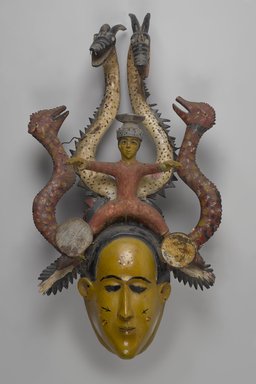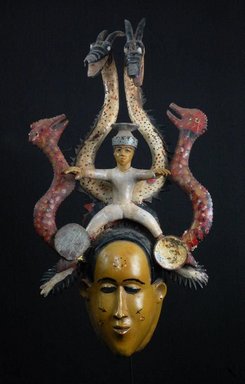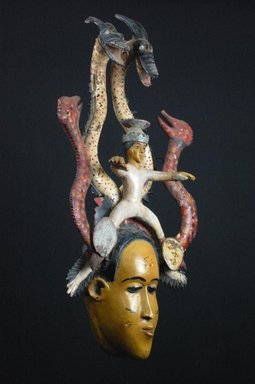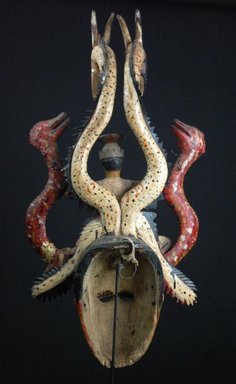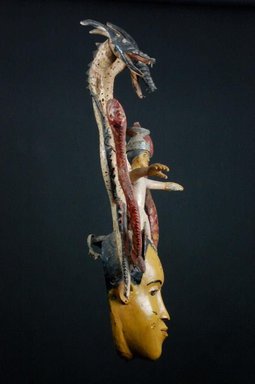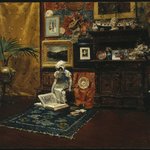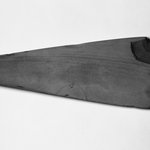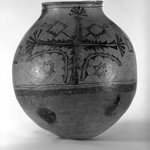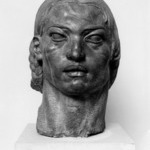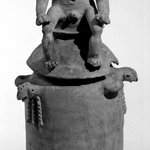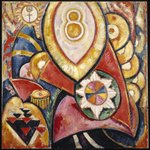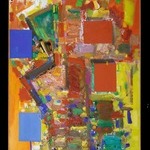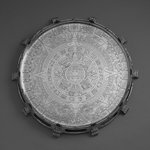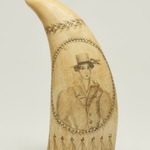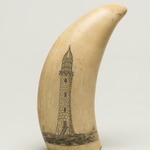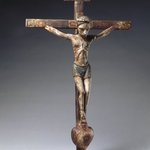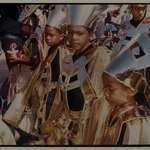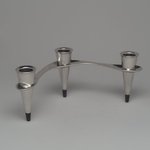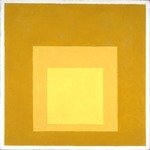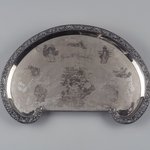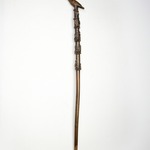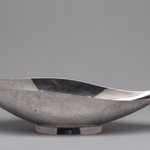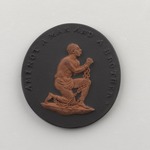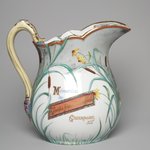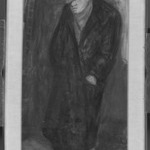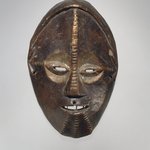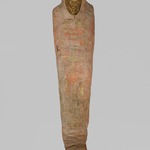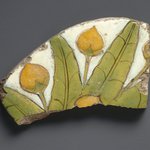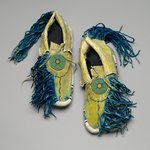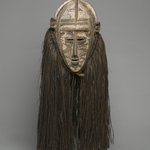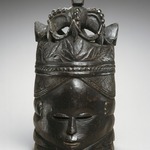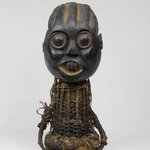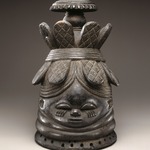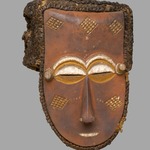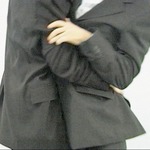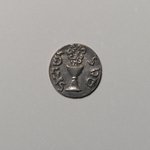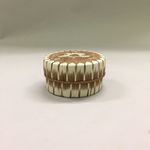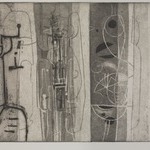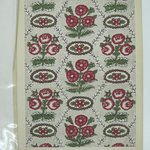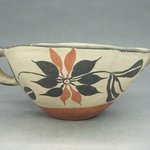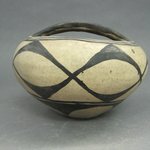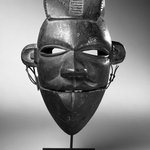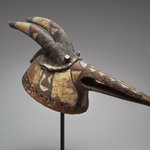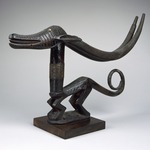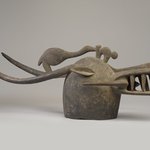Mask for the Ordehlay (Ode-Lay) or Jollay Society
Arts of Africa
A kotu (masquerade builder) made this mask for a Freetown cultural society, a kind of mutual aid association. These masquerades emerged from Yorùbá practices transplanted from Nigeria during World War I. Cultural (or masquerade) societies and the neighborhoods they support pride themselves on innovation. Like the city of Freetown itself, masquerade-society masks have evolved to reflect new, international influences. The mask’s face shape and “fancy” aesthetic suggest it was created for entertainment. Its dragons reflect the former popularity of Chinese movies and martial arts in Freetown. The snakes likely allude to the transcultural water spirit Mami Wata. Though her origins probably pre-date European contact, her snake-charmer persona draws heavily from a 1955 Indian lithographic reproduction of German posters of nineteenth century Samoan circus performer Maladamatjaute. Just as the Greek-Egyptian god Serapis’ cult spread widely, Freetown masquerades are now performed on both sides of the Atlantic.
MEDIUM
Wood, paint, plastic, metal
DATES
mid–20th century
DIMENSIONS
29 1/2 x 16 15/16 x 8 1/4 in. (75 x 43 x 21 cm)
with mount approx: 34 in. (86.4 cm)
(show scale)
ACCESSION NUMBER
2013.25
CREDIT LINE
Gift of Dr. and Mrs. Milton Gross, by exchange
CATALOGUE DESCRIPTION
Mask with a human face as a base, from which all sculptural elements are attached. A figure sits at the top of the head; two sets of dragons flank the base. The taller pair, whose heads are separately carved in wood, have crenelated crests. The shorter, lower pair are blunt-nosed and connected by metal wire to the taller pair. Several layers of commercial paint in various colors have been applied to the entire object, with spotted colors of red, blue, yellow, and white painted to both sides of the dragon pairs. The interior of the mask is not painted, with some signs of wear. The crested section on the exterior back of the base has a hole.
MUSEUM LOCATION
This item is not on view
CAPTION
Temne artist. Mask for the Ordehlay (Ode-Lay) or Jollay Society, mid–20th century. Wood, paint, plastic, metal, 29 1/2 x 16 15/16 x 8 1/4 in. (75 x 43 x 21 cm). Brooklyn Museum, Gift of Dr. and Mrs. Milton Gross, by exchange, 2013.25. Creative Commons-BY (Photo: Brooklyn Museum, 2013.25_PS9.jpg)
IMAGE
overall, 2013.25_PS9.jpg. Brooklyn Museum photograph, 2015
"CUR" at the beginning of an image file name means that the image was created by a curatorial staff member. These study images may be digital point-and-shoot photographs, when we don\'t yet have high-quality studio photography, or they may be scans of older negatives, slides, or photographic prints, providing historical documentation of the object.
RIGHTS STATEMENT
Creative Commons-BY
You may download and use Brooklyn Museum images of this three-dimensional work in accordance with a
Creative Commons license. Fair use, as understood under the United States Copyright Act, may also apply.
Please include caption information from this page and credit the Brooklyn Museum. If you need a high resolution file, please fill out our online
application form (charges apply).
For further information about copyright, we recommend resources at the
United States Library of Congress,
Cornell University,
Copyright and Cultural Institutions: Guidelines for U.S. Libraries, Archives, and Museums, and
Copyright Watch.
For more information about the Museum's rights project, including how rights types are assigned, please see our
blog posts on copyright.
If you have any information regarding this work and rights to it, please contact
copyright@brooklynmuseum.org.
RECORD COMPLETENESS
Not every record you will find here is complete. More information is available for some works than for others, and some entries have been updated more recently. Records are frequently reviewed and revised, and
we welcome any additional information you might have.
What's the story here?
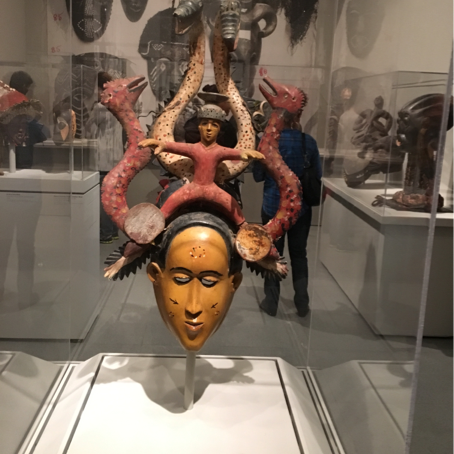
Hello! This Ode-Lay Mask by a Temne artist dates to the 1970s. It comes from the city of Freetown in Sierra Leone. At that time, kung-fu movies were a new and
very popular genre, and likely captivated the artist responsible for this mask. Ode-Lay masquerade is rooted in contemporary urban culture, which is surprising to many visitors.
It's a great example of how masquerade is a living, constantly evolving tradition!
